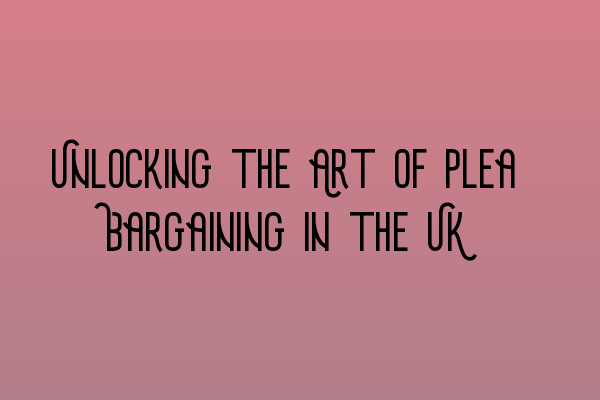Unlocking the Art of Plea Bargaining in the UK
In the criminal justice system of the United Kingdom, plea bargaining plays a significant role in resolving cases efficiently and effectively. As a solicitor, understanding how to navigate the intricacies of plea bargaining can make a crucial difference in achieving favorable outcomes for your clients. In this blog post, we will explore the art of plea bargaining in the UK, its benefits, and offer insights on how to master this essential skill.
What is Plea Bargaining?
Plea bargaining involves negotiations between the prosecution and defense, where the defendant agrees to plead guilty to a lesser charge or cooperate in exchange for a reduced sentence. This process helps streamline the court system, reduces the burden of lengthy trials, and provides both parties with a level of certainty in the outcome.
Benefits of Plea Bargaining
There are several advantages to plea bargaining, both for defendants and the criminal justice system as a whole. Some of these benefits include:
- Reduction in Sentence: By accepting a plea deal, defendants may receive a reduced sentence compared to what they would face if convicted at trial.
- Cost Savings: Plea bargains save both the prosecution and defense significant time and resources by avoiding lengthy trials.
- Efficiency: Resolving cases through plea bargaining helps the court system operate more smoothly and expeditiously.
- Certainty: By reaching a plea agreement, defendants have a clearer understanding of the penalties they will face, providing them with some control over their destiny.
To fully leverage the benefits of plea bargaining, it is essential to possess the necessary skills and knowledge. Developing expertise in negotiation, understanding the nuances of the law, and keeping up with evolving legal precedents are all integral to successful plea bargaining.
Mastering the Art of Plea Bargaining
Successful plea bargaining requires careful preparation and a deep understanding of both the facts of the case and the client’s interests. Here are some key steps to consider:
- Thorough Case Evaluation: Assess the strengths and weaknesses of the prosecution’s case, as well as any potential defenses, to identify opportunities for negotiation.
- Client Consultation: Understand your client’s goals, preferences, and willingness to cooperate. This information will help guide the negotiation process.
- Legal Research: Stay updated with recent legal developments and precedents that may impact the case. This knowledge will allow you to make informed arguments during negotiations.
- Effective Communication: Build rapport with the prosecution and clearly articulate your client’s position. Strong advocacy skills are essential for achieving favorable outcomes.
- Flexible Approach: Be prepared to adapt your strategy during negotiations to account for new information or changes in circumstances.
To further enhance your plea bargaining skills, consider enrolling in SQE 1 Practice Exam Questions and SQE 1 Practice Mocks FLK1 FLK2 to gain practical experience with simulated scenarios. These resources will provide valuable insights into the negotiation process and help you refine your techniques.
Additionally, attending SQE 2 Preparation Courses and SQE 1 Preparation Courses can enhance your overall legal knowledge, ensuring you stay ahead in the ever-changing landscape of criminal law.
Conclusion
Plea bargaining is an art that requires expertise, strategic thinking, and a thorough understanding of the legal landscape. By mastering this essential skill, you will be better equipped to serve your clients and achieve favorable outcomes in the criminal justice system.
To stay updated on the latest legal news, examination dates, and information regarding SQE, visit the SRA SQE Exam Dates page.
